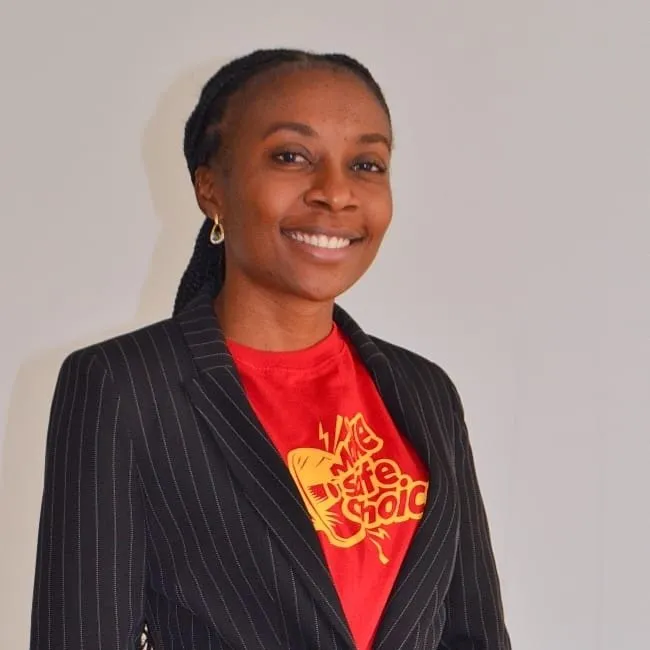Young Women in Action: JCU Hosts NGO Executive Director Besa Mwansa
As part of Professor Ieva Jākobsone Bellomi’s NGO Consulting Lab course (BUS/PL 325), JCU had the pleasure of hosting Besa Mwansa, Executive Director of Young Women in Action (YWA), a youth-led, Zambian NGO committed to transforming the lives of young women for the better. A lawyer by profession, Mwansa is a passionate women’s and children’s rights activist with over a decade of experience in governance, gender-based violence prevention, and human rights advocacy. She brings not only legal expertise but also a deep commitment to gender equity and youth leadership programs.

Under her leadership, YWA works to improve and empower the lives of young women in Zambia by focusing on four strategic areas: governance and leadership, gender advocacy, sexual and reproductive health (including HIV awareness and teen pregnancy prevention), and economic support. The organization’s broader vision is to become a leading force in improving young women’s livelihoods across Zambia by advancing their leadership, development, socio-economic well-being, and health.
How to Start an NGO: Begin with the Dream Itself
During her engaging talk, Mwansa walked students through what it takes to start and sustain a community-based NGO, grounding her insights in both personal experience and practical knowledge. She emphasized asking key questions at the outset; for example, “Where is the need?”, “Who are we trying to serve?”, and “Who are our potential partners and funders?” She explained that understanding local context is everything, as needs vary greatly by location and community.
When asked about where to start with the launching of an NGO, Mwansa encouraged beginning with the dream itself, putting the idea on paper, giving it a name, and outlining its core purpose even before navigating legal requirements. From there, developing formal documents such as proposals, constitutions, and a concise “profile document” is essential before pursuing legal registration. She also highlighted the need to proactively identify funding sources and continuously build credibility through an online presence and community engagement.
On the topic of fundraising, Besa shared valuable advice: always have a concept note, a proposal, and a budget ready; directly approach institutions and funders; and be persistent despite rejections. She also raised a cautionary point about “bad funding,” explaining that some funding sources may be misaligned with an NGO’s long-term goals or may come with restrictive conditions. It’s crucial to assess potential funders’ intentions and ensure compatibility in both vision and execution.
The Challenges of YMA in Zambia
Mwansa also addressed the broader challenges that YWA and other NGOs are facing in Zambia. For instance, the recent USAID funding withdrawal has left critical gaps in HIV-related healthcare and emergency services. While YWA was not a direct partner, the ripple effects are deeply felt, as there is more need but fewer resources.
She spoke about legal and institutional obstacles as well, noting that Zambia currently lacks legislation mandating gender representation in parliament. This makes YWA’s advocacy for women in politics more difficult. Nonetheless, the organization is actively building a database of young women interested in running for office in the upcoming general elections. Once completed, they will offer support in leadership training, campaign preparation, and resource mobilization.
On advocacy, Mwansa acknowledged that cultural resistance rooted in tradition and religion often impedes gender equality efforts. Yet, YWA’s approach is refreshingly grounded. Instead of abstract policy arguments, they focus on relatable, community-specific messaging. For example, rather than challenging deeply held beliefs directly, they start with influential women in familiar spaces, like churches, showing how much more these women could contribute if given proper support and platforms. “Engaging community leaders first helps shift public opinion more organically,” explained Mwansa.
Speaking on government relations, Mwansa explained that while Zambia’s government is not antagonistic toward NGOs like YWA, it is largely indifferent. The organization is free to question and advocate, but often receives no response. Still, Mwansa remains hopeful especially with discussions around constitutional reform underway and believes that consistent engagement, including presenting in parliament, is the only way forward.
JCU is grateful to Besa Mwansa for taking the time to share her experiences and insight with our students. Her talk offered a rare blend of inspiration and pragmatism, demonstrating how passion, persistence, and a strong community focus can create meaningful change even in challenging environments.
(Bersabeh Mergia)





